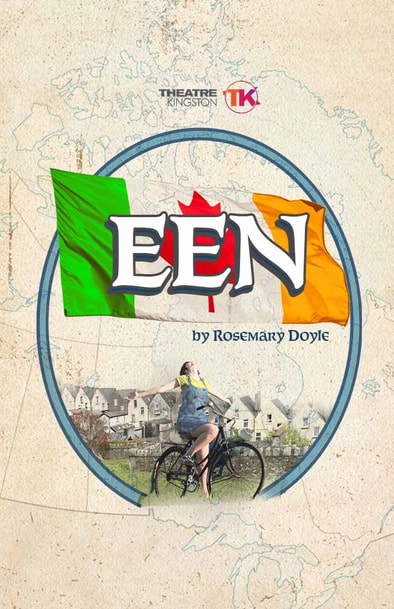Help, I’m turning into My Grandmother! ‘EEN”s Journey through Generations

It’s a classic clash of generations: Canadian high school grad Tanya arrives in Ireland and is flabbergasted by her grandmother’s seemingly backwards lifestyle. Mary, Tanya’s Nan, is set in her ways— she prefers to cover the electric stovetop with a tablecloth and cook her meals on a fire, so-called progress be damned. Over a long summer filled with uphill bike rides, intercultural misadventures, and cups of tea with a mysterious neighbour, Tanya and Mary grow to appreciate one another. In between Tanya’s jabs about boiled food and keen descriptions of unpleasant smells, Rosemary Doyle’s EEN unravels a family’s long-held secrets with humour and empathy.
Pulling double duty as playwright and set designer, Doyle takes great advantage of the Tett Centre Rehearsal Hall, with three limestone-and-brick walls hugging the audience and a fourth draped with swathes of fabric, laundry line-style. Ducking under two large pieces of cloth at the door—green and orange, naturally—I felt like I’d been teleported into the middle of Mary’s house. As I made my way to my seat, I was half tempted to sit down on the big wooden bed or curl up in the copper bathtub that sat on the stage.
In her program note, Doyle writes that Mary’s house comes from memories of her own grandmother’s house. The set is arranged with obvious tenderness and a clear sense of humour. Next to a window frame that decorates the invisible kitchen wall, I spotted a painting of Jesus hanging a few centimetres above a photograph of John F. Kennedy. My partner pointed out four empty bottles: three milk, one whisky. I’d say EEN followed a similar ratio: three parts tender to one part shenanigans.
Tanya (Siobhán McMahon) is introduced through a long monologue, after which Mary (Rosemary Euringer) makes a wry remark about Tanya talking to herself. There is a lot of talking in this play, and much of it is done by McMahon in her three roles as Tanya, her mother Maureen, and young Mary. After some initial stiffness, McMahon warmed into the performance and delivered her monologues with charisma. McMahon seems most at ease expressing herself through movement, thriving in moments of physical comedy. Liam Karry’s direction takes advantage of this: we see Tanya bicycling up an imaginary hill, fumbling with a spilling backpack, and gesticulating wildly while recounting the sight of young men shearing sheep in Hollywood, Ireland.
Mary starts off terse, saying, “There’s a reason I live alone—I like the quiet.” Euringer maintains an engaging stage presence through her silences, and it’s a joy to watch emotions emerge from her highly expressive face. My favourite moment was when Tanya told the audience that her Nan had received a gentleman caller and Euringer’s face opened into a warm, dimpled smile. While her initial role is a quiet one, Euringer is the first performer to sing, and she does so beautifully—a wonderful surprise at what I’d expected to be a non-musical play.
Music and poetry are two standout elements of EEN. The story is framed with Euringer reading poems by 20th-century Irish poet W. B. Yeats. Guitarist Kevin Head provides some playful acoustic fingerpicking during scene transitions and later joins the cast in three-part harmony as they sing familiar songs and ballads. The cast’s sung rendition of Yeats’ “Down By the Salley Gardens” provides a smooth and clever transition through the play’s first change in time periods. Euringer starts off singing the melody, and McMahon takes over in the second verse as she puts on Euringer’s scarf and assumes the role of young Mary.
After passing the role of Mary to McMahon, Euringer is charming—and, finally, talkative!—as Mary’s elderly Auntie Bridget. Meanwhile, McMahon steps between the roles of young Mary and Maureen with a new confidence that she later brings back to playing Tanya. While accessories and accent changes help the audience keep tabs on the switching characters, more distinct characterisation from the actors could help make these transitions clear. That said, I imagine it’s tricky to play four generations of women who find themselves turning into their mothers.
Shelby VanLuven’s lighting design is subtle and naturalistic, and Head’s guitar balances well with the performers’ voices. There were moments during last night’s performance when the sound of a dance class above the Rehearsal Hall broke my immersion, but it was easy enough to pretend that the stomping feet were raindrops on Nan’s galvanized metal roof.
Overall, this was a lovely opening performance, and I believe that Theatre Kingston’s production of EEN will continue to charm audiences over its four-week run. This is a show worth seeing, even if it means an uphill bike ride home from the Tett—and even if Kingston’s snowy roads are a little more treacherous than the rolling Irish countryside.
‘EEN’ is playing at the Tett Centre until March 25 and more information can be found here. If you’re interested in some insight from the playwright herself, be sure to check out the interview with Rosemary Doyle.
This article was edited on December 1st, 2023 to update formatting.